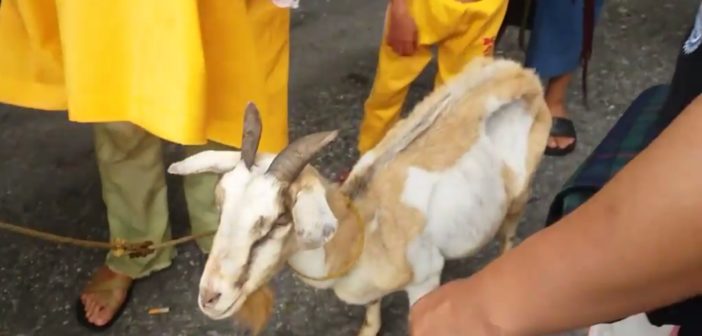The Philippine Animal Welfare Society (PAWS) condemns the cruel killing of animals for the film Balangiga: Howling Wilderness, an official entry to the 2017 Circle Competition of QCinema directed by Khavn dela Cruz, which won four awards including Best Picture at the festival on October 27th.
Several instances of cruelty and abuse to animals were involved in the making of the film. In all cases of animal violence in the story, humane alternatives to the graphic depictions of animal suffering were available. From a storytelling standpoint as well, the ideas and emotions of the film could be effectively conveyed without the need for actual violence to any living creature on set.
Balangiga is not a documentary in which real situations and events unfolded by themselves, and were merely witnessed and recorded by a filmmaker. Even though its setting refers to a true event in Philippine history, Balangiga is a work of fiction in which every scene was scripted and staged. So, just as in a movie about war or murder there is no need to actually hurt or kill human actors, actual violence and abuse to animals is never required and cannot be justified in filmmaking. This should be the general ethical rule that responsible and compassionate filmmakers live by.

‘Balangiga’ wins Best Picture at QCinema festival. Still from Pintura Channel, YouTube, fair use.
The scene in Balangiga in which a live pig writhes in pain as it slowly dies while impaled on an upright stick is a violation of the Animal Welfare Act. This form of cruelty and torture is something that would not even happen in a slaughterhouse or in a routine killing so that the pig’s meat can be consumed.
All of the scenes containing dead animals or animals to be consumed in Balangiga could have procured meat from common sources. A live chicken need not have been actually decapitated in front of an eight-year-old actor.
Furthermore, in the scene in which an old man straddles a live goat in an implied act of “bestiality,” one can clearly see the live goat suffering from the man’s suffocating embrace as it feebly kicked and struggled to get away from the actor.
The horrifying torture of live animals and cruelty in Balangiga cannot be defended by the statement that these animals (chickens, pigs, goats and carabaos, or Philippine water buffaloes) are commonly eaten for food. The killing scenes are in gross violation of the National Meat Inspection Code, as well as the Animal Welfare Act’s Rules and Regulations on the Humane Handling in the Slaughter of Animals. (AO #12 for chickens, AO #41 for pigs and AO #18 on Slaughter of Food Animals)
PAWS calls on the Department of Agriculture and the agencies under it – such as the Bureau of Animal Industry – Animal Welfare Division (BAI-AWD) and the National Meat Inspection Service (NMIS) – to take the necessary legal measures against the filmmakers of Balangiga for violating the aforementioned laws.
We likewise implore the QCinema organizers and the Quezon City government to not allow films with obvious acts of animal cruelty to receive funding and to participate in festivals which aim to showcase the best of Filipino movies.
Cruelty is against the law and can never be part of good filmmaking. Let us not provide a vehicle for filmmakers devoid of compassion and conscience to produce films which will only put Filipinos in a bad light.
Filipino moviegoers deserve better. All animals deserve to be treated with kindness and respect.
Featured image: goat on the set of Balangiga: Howling Wilderness. Still from Althea Vega, YouTube, fair use.





